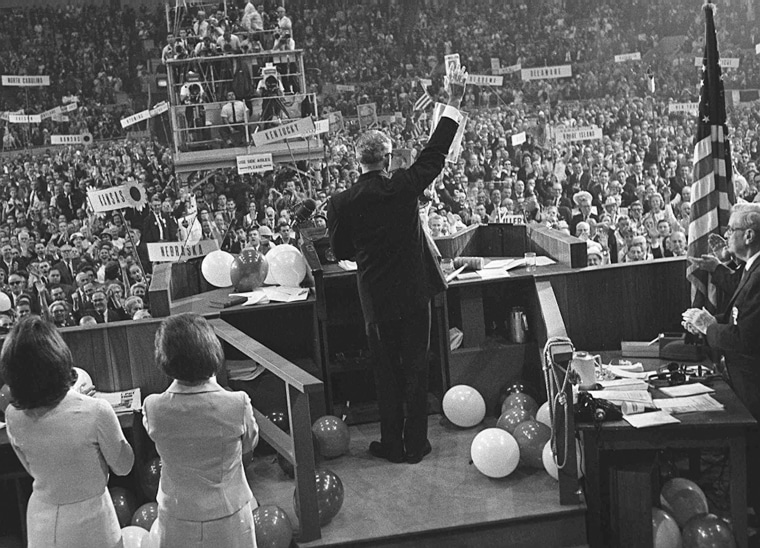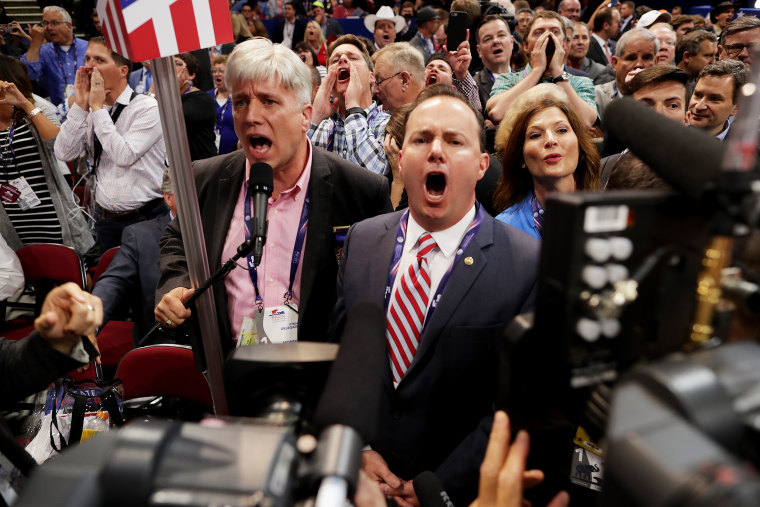As Republicans prepare to nominate the polarizing real estate mogul Donald Trump as their candidate for the presidency, it's hard not to see some parallels with the GOP convention of 1964, arguably the last time the party got behind a contender whose temperament was consistently called into question.

That year, conservative icon Sen. Barry Goldwater was the Republicans' standard bearer, and his staunch opposition to the 1964 Civil Rights Act, coupled with his occasional loose talk about the use of nuclear weapons and the support he drew from hate groups, was unsettling to a lot of mainstream voters. In fact, resistance was so strong within his own party that it inspired a famous ad (recently replicated by Hillary Clinton) featuring a lifelong Republican explaining his tortured emotions over his candidacy and why he couldn't bring himself to vote for him.
Today, Trump has also been a divisive figure among some rank-and-file Republicans, as evidenced by a recent NBC News/Wall St. Journal poll that suggests that only 38 percent of them are satisfied with him as their nominee. A whopping 78 percent believe their party is divided in the wake of his impending nomination. Not unlike Goldwater, Trump has faced intra-party efforts to derail his candidacy late in the nomination process and has been dogged by headlines predicting a similar landslide defeat in the fall, even as he stormed his way to an unlikely victory in the primary against 16 formidable opponents.
Related: Anti-Trump Delegates Cause Chaos on Opening Day of GOP Convention
Trump, too, has been widely criticized for not more effectively distancing himself from supporters who espouse extremist views, for taking controversial positions on immigration and religious freedom, as well as for shooting wildly from the hip when it comes to national security matters.
For their part, the Goldwater family is not a fan of their patriarch's political legacy being linked to the Donald.
“Barry would just go absolutely go crazy if he were watching this today,” Goldwater's widow Susan told MSNBC earlier this year. “He would be yelling at the television. He would think it’s embarrassing, this situation we have with Donald Trump. It’s not the Republican Party or the country that we knew 25 or 30 years ago.”
“Barry was a quiet moderate and rational man, despite opinions to the contrary. And 25 years ago, he was appalled by the rise of the extreme Christian right,” she added. “The bigotry and the religious extremism is just wrong, wrong, wrong.”
Despite Goldwater's brutal defeat in November of 1964, many of his more conservative positions would become a part of the political mainstream in the ensuing decades, and his convention did help produce one of the Republican Party's brightest stars -- Ronald Reagan. Then known mostly as a Hollywood actor, Reagan would emerge as a political sensation following his speech at the 1964 convention, later dubbed “A Time for Choosing.”
His well-received oration would, in the minds of many voters, be overshadowed by Goldwater's defiant acceptance speech, in which he declared that "extremism in defense of liberty is no vice." In November, Goldwater would lose all but six states -- his only victories coming in his home state of Arizona and in the deep South. Current polls show Trump trailing his Democratic opponent, Hillary Clinton, but in much better standing than his predecessor was in 1964.
As he rolls out his agenda and rehashes his biography for the next four days, Trump will face a similar challenge to the one Goldwater did -- he must try to sell the American public on the notion that he is not reckless, but reasonable. It may be his last opportunity to change the often unflattering narrative that has begun to take hold regarding his campaign and its chances for victory.
